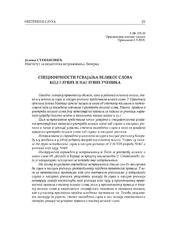Peculiarities in adopting capital letter in deaf and hard-of-hearing pupils
Specifičnosti usvajanja velikog slova kod gluvih i nagluvih učenika
| dc.creator | Stevanović, Jelena | |
| dc.date.accessioned | 2021-03-17T13:28:42Z | |
| dc.date.available | 2021-03-17T13:28:42Z | |
| dc.date.issued | 2009 | |
| dc.identifier.issn | 0354-8759 | |
| dc.identifier.uri | http://ipir.ipisr.org.rs/handle/123456789/135 | |
| dc.description.abstract | Capital letter is a very significant area of orthography, both in regular primary school and the school for deaf and hard-of-hearing pupils. The Serbian Language Orthography by Matica Srpska contains over one hundred chapters and subchapters dedicated to the norms of the use of capital letter. Namely, the rules on the use of capital letter are orthographic rules which pupils encounter earliest (spelling their names and surnames, name of the school etc.). The goal of the research is the way of adoption and peculiarities in adoption of orthographic rules on the use of capital letter in deaf and hard-of-hearing pupils and the influence of age, degree of hearing impairment and gender on adoption of rules on the use of capital letter in deaf and hard-of-hearing pupils. Research was conducted in schools for deaf and hard-of-hearing pupils in Belgrade and Jagodina and in one regular primary school in Belgrade. The sample consisted of two groups of respondents: deaf and hard-of-hearing pupils from 5th to 8th grade, N=67, and hearing pupils, N=60. The instrument used in the research is the Test for the Use of Capital and Small Letter (N. Dimic) and Corpus for Literacy Evaluation (J. Stevanovic), devised exclusively for the purposes of this research. Based on the results of the conducted research, we reached the conclusion that deaf and hard-of-hearing pupils use certain orthographic rules. With respect to the orthographic demands which we set to the pupils in deaf and hard-of-hearing pupil population, the results indicate that deaf and hard-of-hearing pupils accomplish lower achievement than the hearing pupils in applying orthographic rules on the use of capital letter, except in applying the rule about the use of capital letter in geographic names consisting of several elements and names of ethnics, as well as in spelling the possessive adjectives derived by the suffix-ev. In addition to this, the results indicate that age, degree of hearing impairment and gender do not have a statistically significant influence on the adoption of the rule on the use of capital letter. | en |
| dc.description.abstract | Posebno značajnu pravopisnu oblast, kako u redovnoj osnovnoj školi, tako i u školi za gluve i nagluve učenike predstavlja veliko slovo. U Pravopisu srpskoga jezika Matice srpske nalazi se više od stotinu poglavlja i potpoglavlja koja su posvećena normama o upotrebi velikog slova. Naime, pravila o upotrebi velikog slova jesu ortografska pravila sa kojima se učenici najranije susreću (pisanje imena i prezimena, naziva škole i sl.). Cilj istraživanja predstavlja način usvajanja i specifičnosti usvajanja ortografskih pravila o upotrebi velikog slova kod gluvih i nagluvih učenika i kakav je uticaj uzrasta, stepena oštećenja sluha i pola na usvajanje pravila o upotrebi velikog slova kod gluvih i nagluvih učenika. Istraživanje je sprovedeno u školama za gluve i nagluve učenike u Beogradu i u Jagodini i u jednoj redovnoj beogradskoj osnovnoj školi. Uzorak su činile dve grupe ispitanika: gluvi i nagluvi učenici od V do VIII razreda, N=67 i učenici koji čuju, N=60. Instrument korišćen u istraživanju je Test za upotrebu velikog i malog slova (N. Dimić) i Korpus za procenu pismenosti (J. Stevanović), koji je koncipiran isključivo za potrebe ovog istraživanja. Na osnovu rezultata sprovedenog istraživanja došli smo do zaključaka da gluvi i nagluvi učenici upotrebljavaju pojedina pravopisna pravila. U vezi sa pravopisnim zahtevima koje smo postavili učenicima u populaciji gluvih i nagluvih učenika, rezultati ukazuju da gluvi i nagluvi učenici ostvaruju lošije postignuće, nego učenici koji čuju, u primenjivanju pravopisnih pravila o pisanju velikog slova, osim u primenjivanju pravila o pisanju velikog slova u višečlanim geografskim nazivima i nazivima etnika, kao i u pisanju prisvojnih prideva izvedenih nastavkom-ev. Takođe, rezultati pokazuju da uzrast, stepen oštećenja sluha i pol nemaju statistički značajan uticaj na usvajanje pravila o pisanju velikog slova. | sr |
| dc.publisher | Univerzitet u Beogradu - Fakultet za specijalnu edukaciju i rehabilitaciju, Beograd | |
| dc.rights | openAccess | |
| dc.source | Beogradska defektološka škola | |
| dc.subject | Serbian language orthography | en |
| dc.subject | orthographic rules | en |
| dc.subject | the use of capital letter | en |
| dc.subject | deaf and hard of hearing pupils | en |
| dc.subject | hearing pupils | en |
| dc.subject | Serbian language instruction | en |
| dc.subject | pravopis srpskog jezika | sr |
| dc.subject | ortografska pravila | sr |
| dc.subject | pisanje velikog slova | sr |
| dc.subject | gluvi i nagluvi učenici | sr |
| dc.subject | učenici koji čuju | sr |
| dc.subject | nastava srpskog jezika | sr |
| dc.title | Peculiarities in adopting capital letter in deaf and hard-of-hearing pupils | en |
| dc.title | Specifičnosti usvajanja velikog slova kod gluvih i nagluvih učenika | sr |
| dc.type | article | |
| dc.rights.license | ARR | |
| dc.citation.epage | 41 | |
| dc.citation.issue | 3 | |
| dc.citation.other | (3): 25-41 | |
| dc.citation.rank | M52 | |
| dc.citation.spage | 25 | |
| dc.identifier.fulltext | http://ipir.ipisr.org.rs/bitstream/id/745/conv_193.pdf | |
| dc.identifier.rcub | https://hdl.handle.net/21.15107/rcub_ipir_135 | |
| dc.type.version | publishedVersion |

